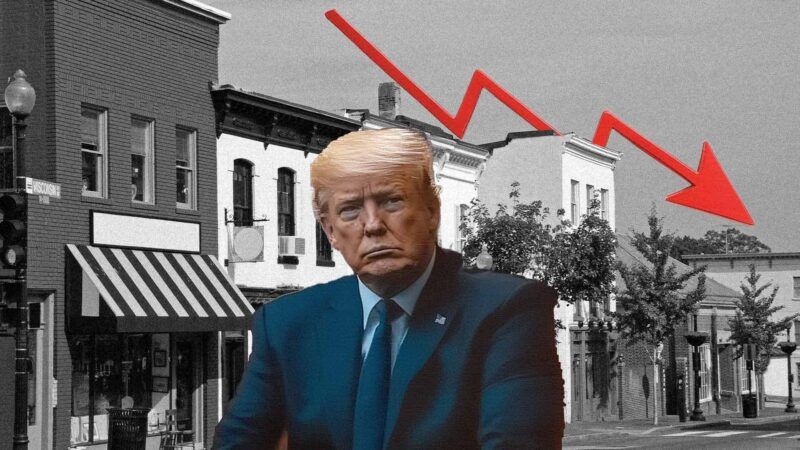Trump's Tariffs Are Sapping Small Business Optimism
Seasonally adjusted job openings and capital outlay spending are declining to levels not seen since the height of the COVID-19 pandemic.

New survey data show that President Donald Trump's quickly evolving and unpredictable tariff policies are causing small businesses to be less optimistic about the economy. The National Federation of Independent Businesses (NFIB) recently released its April survey of over 1,000 small business owners in the United States. The report found that business optimism declined by 1.6 points to 95.8, marking "the second consecutive month" the metric fell "below the 51-year average of 98."
Components of the NFIB index are hitting levels not seen since the COVID-19 pandemic. Seasonally adjusted job openings fell below 34 percent (lowest since January 2021). Meanwhile, only 18 percent of firms said they were planning capital outlays in the next six months—the first decline since September 2024 and the lowest since April 2020. The number of small business owners expecting an increase in real sales volume fell by four points, making it "the fourth consecutive month real sales expectations declined after surging from recession levels after the election."
Only 15 percent of owners expect better business conditions, a six-point decline since March, and the lowest since October 2024.
"Uncertainty continues to be a major impediment for small business owners in operating their businesses in April, affecting everything from hiring plans to investment decisions," Bill Dunkelberg, NFIB's chief economist, told The Center Square. "While owners are still trying to fill a high number of current job openings, their outlook on business conditions is less supportive of future business investments."
Since Inauguration Day, the Trump administration has announced new or revised tariff policies more than 50 times, according to a tally by The Washington Post. More than a dozen tariff-related executive orders have been issued, averaging about one per week. It's a lot for anyone to keep up with, let alone small business owners who are tasked with running day-to-day business operations.
Although few small businesses export their goods and services, many rely on imported goods as inputs, according to the NFIB survey. Unpredictable turns instigated by Trump's trade war are "suddenly and dramatically changing relative prices (costs), and relative prices drive all decisions. Uncertainty remains elevated and thus caution clouds spending, hiring, and investing decisions."
Trump believes that higher prices on imported goods will drive more investment in American businesses—even if over 1,500 economists beg to differ. In the meantime, American small businesses are struggling, and might not be able to maintain a competitive edge while waiting for supply chains and the market to stabilize.


Show Comments (48)